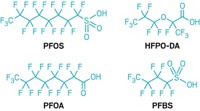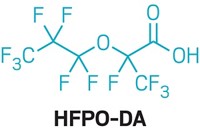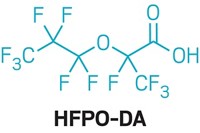Advertisement
Grab your lab coat. Let's get started
Welcome!
Welcome!
Create an account below to get 6 C&EN articles per month, receive newsletters and more - all free.
It seems this is your first time logging in online. Please enter the following information to continue.
As an ACS member you automatically get access to this site. All we need is few more details to create your reading experience.
Not you? Sign in with a different account.
Not you? Sign in with a different account.
ERROR 1
ERROR 1
ERROR 2
ERROR 2
ERROR 2
ERROR 2
ERROR 2
Password and Confirm password must match.
If you have an ACS member number, please enter it here so we can link this account to your membership. (optional)
ERROR 2
ACS values your privacy. By submitting your information, you are gaining access to C&EN and subscribing to our weekly newsletter. We use the information you provide to make your reading experience better, and we will never sell your data to third party members.
Persistent Pollutants
Chemours to clean up GenX and pay $12 million fine
Legal deal would require company to test fluoroethers for health and environmental effects
by Cheryl Hogue
November 27, 2018

To settle allegations that it tainted drinking water for hundreds of thousands of people in southeast North Carolina with toxic fluoroethers, Chemours has agreed to pay the state $12 million.
The agreement stems from state enforcement actions against Chemours. Under a proposed consent order released Nov. 21, Chemours would pay an additional $1 million to cover the state’s costs for investigating the pollution. Chemours would have to install thermal oxidizing equipment to dramatically reduce air emissions of chemicals related to its GenX fluorosurfactant at its plant outside of Fayetteville.

In addition, the company would have to provide permanent replacement drinking water to homes and businesses with contaminated wells, continue to capture all of the facility’s process water for off-site disposal, and reduce the non-polymeric per- and polyfluoroalkyl substances (PFAS) in groundwater near the plant that seep into the Cape Fear River. A North Carolina court must approve the order before it takes affect.
Fluoroethers contaminate the river downstream of the Fayetteville facility. The chemicals persist after drinking water treatment. They also pollute rain and private wells near the facility, including those not directly hydraulically connected with groundwater below the plant.
In November, the US Environmental Protection Agency issued a draft safe daily dose for hexafluoropropylene oxide dimer acid (HFPO-DA)—the parent acid of GenX—and GenX of 80 ng/kg of body weight per day, combined. The EPA’s hazard numbers are based on studies in laboratory animals showing harmful effects in the liver, kidney, blood, and immune system as well as in fetuses.
Scientists have also identified several additional fluoroethers in the Cape Fear River. Under the consent order, Chemours would have to sponsor health and ecological studies on seven of them. The substances include a by-product of Nafion sulfonated tetrafluoroethylene-based ionic polymers, which are manufactured at the Fayetteville plant. Nafion is used for membranes to produce sodium hydroxide and chlorine and in fuel cells.
The consent order allows Chemours to deny any violation of law and say instead that it agrees to the consent order to avoid the expense and uncertainty of litigation.
The draft consent order “advances the science and regulation of PFAS compounds and gives North Carolina families much needed relief,” says Michael S. Regan, head of the North Carolina Department of Environmental Quality.
Advertisement
However, the Cape Fear Public Utility Authority, which is downstream of the plant and supplies drinking water to the city of Wilmington, faults the draft agreement. The deal does not offer a solution for the utility’s customers, who continue to have GenX and other PFAS in their water despite filtration. In addition, the proposed order doesn’t require remediation of PFAS tainting sediments in the Cape Fear River, the utility says.
Chemours did not respond to a C&EN request for comment.
The Fayetteville plant, which makes and uses GenX, isn’t the only facility that Chemours is working to clean up. The company announced in September that it is investing about €75 million ($85 million) to control water and air releases of GenX and other fluorinated substances from its facility in Dordrecht, the Netherlands.





Join the conversation
Contact the reporter
Submit a Letter to the Editor for publication
Engage with us on Twitter